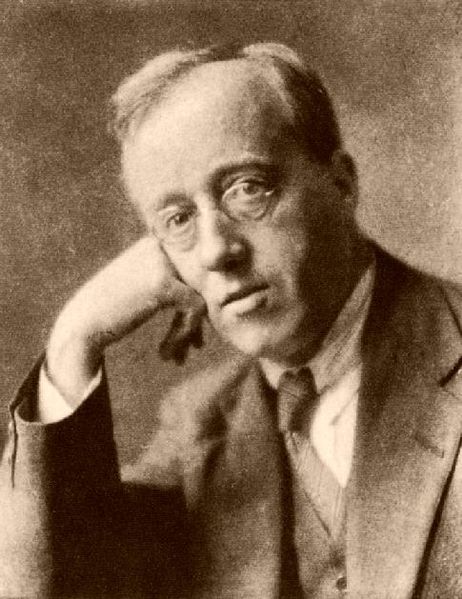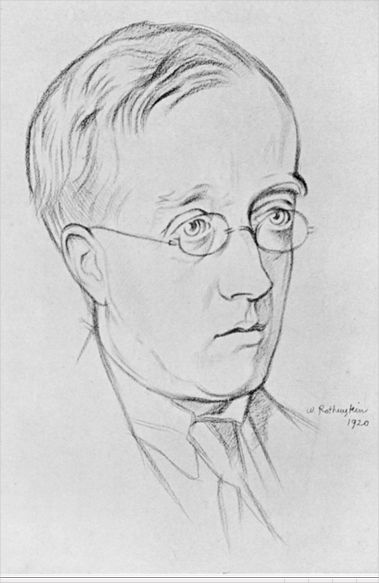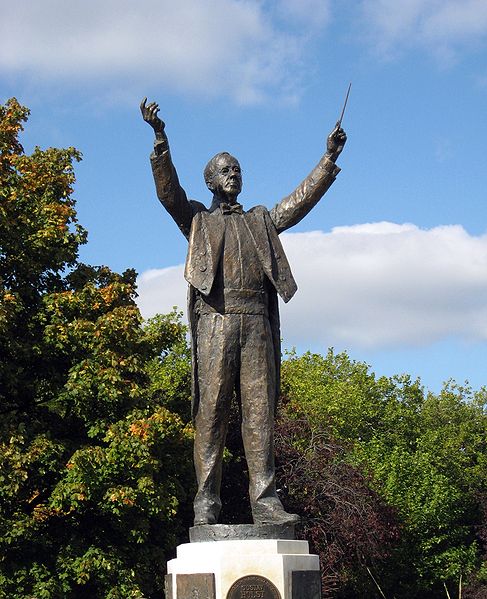<Back to Index>
- Bacteriologist Charles Jules Henry Nicolle, 1866
- Composer Gustav Theodore Holst, 1874
- Holy Roman Emperor Frederick III, 1415
PAGE SPONSOR



Gustav Theodore Holst (born Gustavus Theodor von Holst, 21 September 1874 – 25 May 1934) was an English composer. He is most famous for his orchestral suite The Planets.
Having studied at the Royal College of Music in London, his early work was influenced by Grieg, Wagner, Richard Strauss and fellow student Ralph Vaughan Williams, and later, through Vaughan Williams, the music of Ravel. The combined influence of Ravel, Hindu spiritualism and English folk tunes enabled
Holst to free himself of the influence of Wagner and Strauss and to
forge his own style. Holst's music is well known for unconventional use
of metre and haunting melodies. Holst composed almost 200 works, including operas, ballets, choral hymns and songs. An enthusiastic educator, Holst became music master at St Paul's Girls' School in 1905 and director of music at Morley College in 1907, continuing in both posts until retirement. He was the brother of Hollywood actor Ernest Cossart and father of the composer and conductor Imogen Holst, who wrote a biography of him in 1938. He
was originally named Gustavus Theodor von Holst, but he dropped the
"von" from his name in response to anti-German sentiment in Britain during World War I, making it official by deed poll in 1918. Holst was born on 21 September 1874, at 4 Pittville Terrace (named today Clarence Road), Cheltenham, Gloucestershire, England, to
a family of Swedish extraction (by way of Latvia and Russia). The house
was opened as a museum devoted to Holst's life and times in 1974. Holst's grandfather, Gustavus von Holst (born 1799) of Riga, Latvia, moved to England with his parents as a child; he became a composer of elegant harp music and a notable harp teacher. Holst's father, Adolph von Holst, was organist and choirmaster at All Saints' Church in Pittville. He also gave both piano lessons and recitals, most regularly at the Assembly Rooms. Holst's mother, Clara von Holst, was a singer who bore two sons, Gustav and Emil Gottfried, before she died in 1882: Gustav was then eight. Following
his wife's death, Adolph von Holst moved with his sons to 1 Vittoria
Walk, Cheltenham, and eventually married Mary Thorley Stone in 1885:
she gave birth to two further sons, Matthias Ralph and Evelyn Thorley. A
frail child whose early recollections were musical, Holst was taught to
play piano and violin, and began composing when he was about twelve. He also started trombone when his father thought this might improve his son's asthma. He was educated at Cheltenham Grammar School for Boys. He attended the Royal College of Music on a scholarship, where he studied with Charles Villiers Stanford and where in 1895 he met fellow student Ralph Vaughan Williams, who became a lifelong friend. Vaughan Williams's own music was in general quite different from Holst’s, but
he praised Holst's work abundantly and the two men developed a shared
interest in exploring and maintaining the English vocal and choral
tradition as found primarily in folk song, madrigals and church music. Holst
had hoped to build his career partly as a pianist, but stricken from
adolescence with a nerve condition that increasingly affected the
movement of his right hand, he eventually gave up the piano for the trombone. To earn a living in the period before he had a satisfactory income from his compositions, he played the trombone in the Carl Rosa Opera Company and
in a popular orchestra called the "White Viennese Band", conducted by
Stanislas Wurm. The music was cheap and repetitive and not to Holst's
liking, and he referred to this kind of work as "worming" (a pun on
Wurm's name, which means "worm" in German) and regarded it as
"criminal". His need to "worm" came to an end as his compositions
became more successful, and his income was given stability by his
teaching posts. Holst was drawn to socialism during these years and attended lectures and speeches by George Bernard Shaw – with whom he shared a passion for vegetarianism – and by William Morris, both of whom were among the UK's most outspoken supporters of the socialist movement. The poetry of Walt Whitman also had a profound effect, as it did with many of his contemporaries, and he set Whitman's words in The Mystic Trumpeter (1904). He also set poetry by Thomas Hardy and Robert Bridges. During these years Holst also became interested in Hindu mysticism and spirituality, and this interest led to the composition of several works set to translations of Sanskrit texts, including: Sita (1899 – 1906), a three - act opera based on an episode in the Ramayana; Sāvitri (1908), a chamber opera based on a tale from the Mahabharata; 4 groups of Hymns from the Rig Veda (1908 – 14); and two texts originally by Kalidasa: Two Eastern Pictures (1909 – 10) and The Cloud Messenger (1913). The texts of these last three works were translated by Holst himself. To make these translations from Sanskrit to English, Holst enrolled at University College London (UCL)
to study the language as a 'non-matriculated' student. On 14 January
1909 he paid 5 guineas for Sanskrit classes during the spring and
summer terms of that year. The UCL records also show that during this
time he moved from 23 Grena Road in Richmond, to 10 The Terrace in Barnes. On 19 October 1909 he re-enrolled at UCL for the autumn term and paid 3 guineas "special
fee" for his Sanskrit classes of "2 hours a week". The records end at
this point, and so it seems he only spent one year as a student at UCL. Holst was the musical director at James Allen's Girls' School for sixteen years In 1905, Holst was appointed Director of Music at St Paul's Girls' School in Hammersmith, London. In 1907, Holst also became director of music at Morley College. These were the most important of his teaching posts, and he retained both until the end of his life. During the first two decades of the 20th century, musical society as a whole (and Holst's friend Vaughan Williams in particular) became interested in old English folksongs, madrigal singers, and Tudor composers.
Holst shared in his friend’s admiration for the simplicity and economy
of these melodies, and their use in his compositions is one of his
music’s most recognisable features. Holst was an avid rambler.
He walked extensively in Italy, France and England. He also travelled
outside the bounds of Europe, heading to French - controlled Algeria in 1908 on doctor's orders as a treatment for asthma and the depression that crippled him after his submission failed to win the Ricordi Prize, a coveted award for composition. His travels in the Arab and Berber land, including an extensive cycling tour of the Algerian Sahara, inspired the suite Beni Mora, written upon his return. After the lukewarm reception of his choral work The Cloud Messenger in 1912, Holst was again off travelling, financing a trip to Spain with fellow composers Balfour Gardiner and brothers Clifford and Arnold Bax with
funds from an anonymous donation. Despite being shy, Holst was
fascinated by people and society, and had always believed that the best
way to learn about a city was to get lost in it. In Girona, Catalonia,
he often disappeared, only to be found hours later by his friends
having abstract debates with local musicians. It was in Spain that
Clifford Bax introduced Holst to astrology, a hobby that was to inspire the later Planets suite. He read astrological fortunes until his death, and called his interest in the stars his "pet vice". Shortly after his return in 1913, St Paul's Girls School opened a new music wing, and Holst composed the still popular St Paul's Suite for the occasion. In 1913, Stravinsky premiered The Rite of Spring, sparking riots in Paris and caustic criticism in London. A year later, Holst first heard Schoenberg’s Five Pieces for Orchestra, an "ultra-modern" set of five movements employing "extreme chromaticism"
(the consistent use of all 12 musical notes). Although he had earlier
lampooned the stranger aspects of modern music, the new music of Stravinsky and Schoenberg influenced his work on The Planets. Holst's compositions for wind band,
though relatively small in number, guaranteed him a position as the
medium's cornerstone, as seen in innumerable present day programmes
featuring his two Suites for Military Band. His one work for brass band, A Moorside Suite, remains an important part of the brass band repertoire. Holst and wife Isobel bought a cottage in Thaxted,
Essex, and, surrounded by medieval buildings and ample rambling
opportunities, he started work on the suite that would become his best
known work, the orchestral suite The Planets. (The theme from "Jupiter" has been adapted as a hymn tune under the name of "Thaxted", and is usually sung to the words "I Vow to Thee My Country".) At the onset of World War I,
Holst tried to enlist but was rejected because of his bad eyes, bad
lungs and bad digestion. In wartime England, Holst was persuaded to
drop the "von" from his name, as it aroused suspicion. His new music,
however, was readily received as "patriotic" and English music was
demanded at concert halls, partly due to a ban on all "Teutonic" music. Towards the end of the war he was offered a post within the YMCA’s educational work programme as musical director and he set off for Salonica (present day Thessaloniki, Greece) and Constantinople (now Istanbul) in 1918. While he was teaching music to troops eager to escape the drudgery of army life, The Planets Suite was being performed to audiences back home. Shortly after his return after the war’s end, Holst composed Ode to Death, based upon a poem by Walt Whitman. During the years 1920 – 1923, Holst's popularity grew through the success of The Planets and The Hymn of Jesus (1917) (based on the Apocryphal gospels), and the publication of a new opera, The Perfect Fool (a satire of a work by Wagner).
Holst became something of "an anomaly, a famous English composer", and
was busy with conducting, lecturing and teaching obligations. He hated
publicity; he often refused to answer questions posed by the press and
when asked for his autograph, handed out prepared cards that read, "I
do not hand out my autograph". Always frail, after a collapse in 1923
he retired from teaching to devote the remaining (eleven) years of his
life to composition. In
the following years, Holst took advantage of new technology to
publicise his work through sound recordings and the BBC’s wireless broadcasts. Holst began to conduct the London Symphony Orchestra for the Columbia company in 1924, using the acoustic process; his recordings of the period include the Beni Mora suite, the Marching Song and (remarkably) the complete Planets. Although, as his daughter Imogen noted, he couldn't quite achieve the
gradual fade-out of women's voices and orchestra he had written (owing
to the limitations of early recording), it was a landmark recording of
the work. Holst conducted it again, with the same orchestra and for the
same company, in an electrical recording of 1926. This performance was
later issued on LP and CD format. In 1927, he was commissioned by the New York Symphony Orchestra to write a symphony. He took this opportunity to work on an orchestral piece based on Thomas Hardy's Wessex, a work that would become Egdon Heath and
which would be first performed a month after Hardy’s death, in his
memory. By this time, Holst was "going out of fashion", and the piece
was poorly reviewed. However, Holst is said to have considered the
short, subdued but powerful tone poem his greatest masterpiece. The
piece has been much better received in recent years, with several
recordings available. Towards the end of his life, Holst wrote Choral Fantasia (1930), and he was commissioned by the BBC to write a piece for military band; the resulting Hammersmith was a tribute to the place where he had spent most of his life, a musical expression of the London borough (of Hammersmith), which begins with an attempt to recreate the haunting sound of the River Thames sleepily
flowing its way. He then made an orchestral version of this work for
its first performance, sharing the programme with the London premiere of Walton's Belshazzar's Feast. This unlucky coincidence may account for its subsequent obscurity as an orchestral work. Holst had a lifetime of poor health, which worsened due to a concussion during a backward fall from the conductor's podium, from which he never fully recovered. In his final four years, Holst grew ill with stomach problems. One of his last compositions, the Brook Green Suite, named after the land on which St Paul’s Girls’ School was
built, was performed for the first time a few months before his death.
Holst died on 25 May 1934, of complications following stomach surgery,
in London. His ashes were interred at Chichester Cathedral in West Sussex, with Bishop George Bell giving the memorial oration at the funeral. On
Sunday 27 September 2009, after a weekend of concerts at
Chichester Cathedral in memory of Holst, a new memorial was unveiled to
the public. On it are inscribed Holst's dates, and an epitaph, taken
from the text of The Hymn of Jesus, reading "The heavenly spheres make music for us".
In 2007, BBC Radio 4 produced a radio play by Martyn Wade called The Bringer of Peace,
which is an intimate biographical portrait of Holst. The play follows
his early dismay at his lack of composing success, to the creation of The Planets suite, with the play's seven tiers following the structure of The Planets. Adrian Scarborough played Holst, and the producer was David Hitchinson.